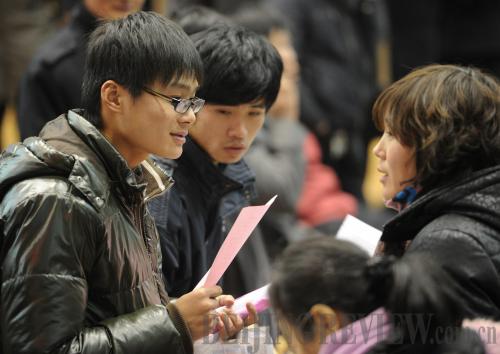|
 |
|
BIG ASPIRATIONS: For college graduates, finding a suitable job in a tough job market is their biggest New Year wish (XINHUA) |
Hollow Statistics
By the end of December 2010, 90.7 percent of the year's college graduates had found work, a spokesperson for the Ministry of Human Resources and Social Security said at a press conference on January 25. This is encouraging news. After all, the ministry's figure for 2009 was 87 percent.
But an investigation into the real employment situation will tell you that the number is nothing to celebrate.
The Report on College Students' Employment 2010 released by MyCOS, an educational research institution, shows that 22 percent of 2009 college graduates who quit jobs after at least six months of employment had come from top-tier universities while the rate for students from other universities was 33 percent.
Besides, 88 percent of the college graduates in 2006 chose to quit their first jobs. These statistics somewhat show their dissatisfaction with their first jobs. To a great extent, the choice of a job was hurried in helpless conditions, and only temporary. So a 90.7-percent employment rate is very uncertain.
Why do graduates hate the jobs so much? Some may have been prevented from taking up a good position by limited capabilities, but for most of them, it is because the huge cost of education was greater than the payment they have received. And 50 percent of them have found their working environment is irrelevant to what they've learned in universities. Ironically, from 2003 to 2008, a college graduate's basic wage remained around 1,500 yuan ($223), while migrant workers' pay rose from 700 yuan ($104) to 1,200 yuan ($179).
The current registered unemployment rate for the ordinary urban labor force is 4.1 percent, but that of college graduates is as high as 9.3 percent. In this sense, the 90.7-percent employment rate for college graduates is not good.
Xi'an Evening News
No Need to Travel
In order to help people get home for Spring Festival family reunions, transport authorities have made great efforts in transport facility and infrastructure construction and ticket services, but there is still big pressure on transport services. If we look at the problem from another perspective, there is much space for transport improvement. The fundamental way out is a lessening of passenger flows.
It's a long tradition for the Chinese to spend the lunar New Year's Eve with their families in their own homes. They will always try to go home at this time of the year. Therefore, the massive population migration is basically unavoidable.
Nevertheless, if migrant workers, who constitute a large group to use Spring Festival transport services, are able to work or run their own business in cities near their homes or in their own villages, the pressure on railway transport will come down sharply. The reality is today's rural areas, particularly in the central and western regions, have been almost all left to the old and the frail, while the young and strong all work in big cities in coastal areas.
Despite the strategy of a large-scale development of China's western region, this region has still not developed to the level that attracts migrant workers back. Improvement efforts must be continued and meanwhile, other measures should be taken to tackle the transport headache.
Dazhong Daily
Avoiding Fat Hongbao
To give relatives, particularly children, hongbao, red envelopes containing cash, as a New Year's gift for good wishes is part of Chinese Spring Festival customs. A recent survey found 70 percent of Hong Kong residents give hongbao containing only HK$20 and only 7 percent of the interviewees said they would put in more than HK$50.
The scenario on the Chinese mainland is totally the opposite. The red envelopes are growing bigger and bigger, being stuffed with several hundred, or even several thousand, yuan. Among relatives, people compete with each other in showing their "generosity." More importantly, hongbao is gradually being used as a tool for bribery. For example, businessmen may offer large hongbao to officials or their children.
Let folk customs be folk customs. It's not a good thing for hongbao to swell further. Here, mainland people need to learn from the Hong Kong people. As for a hongbao containing only HK$20, although it's a small red envelope, it lacks nothing in bringing New Year's joy to the receiver. Instead, a small hongbao implies independence, equality and respect for an individual's life. Rather than encouraging them to show off, this kind of hongbao will help children to develop a correct outlook on values.
The Beijing News
GPS Won't Help
Recently, a member of the Guangdong Provincial Committee of the Chinese People's Political Consultative Conference submitted a proposal to install GPS in government cars to bring them under around-the-clock monitoring.
Installing GPS will make monitoring easier, which sounds useful. But GPS seems not to be competent in preventing officials' appropriation of government cars.
On one hand, in recent years there have been numerous documents and regulations to rein in the abuse of these cars, but they were not very effective. On the other hand, even without GPS, as long as relevant departments pay attention to what's going on with the cars, it's easy to find out what these cars are doing. It's not about a lack of regulation, but a lack of effective supervision and punishment. To supervise and prevent misuse of government cars is originally the responsibility of discipline inspectors and supervisors, but the fact is these people are also among the users of these cars. It is hard for them to supervise what the cars are doing and where they are going.
If the system of internal departmental supervision remains, no matter what technically advanced machines are installed in cars, the cars will continue to be used as before. So it's better not to waste the taxpayers' money on this program.
Guangzhou Daily | 